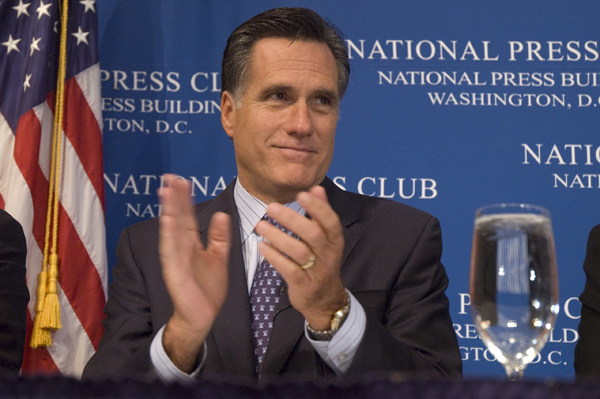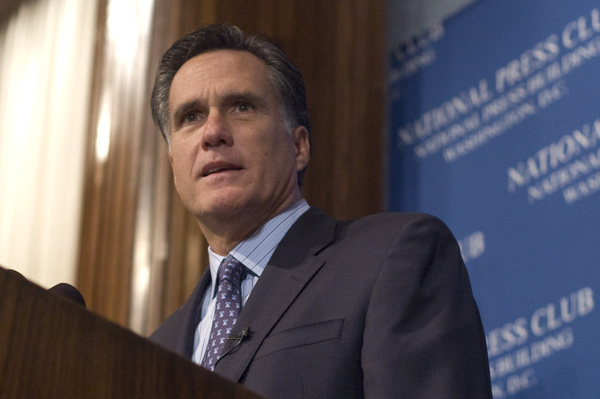
"I'm concerned and convinced that
what's happening in Washington, not just this year but over the last
decades, is slowly but surely stripping away that spirit of enterprise
and innovation and creativity and personal freedom, and that if we're
not careful we could smother the very source of what makes America
unique in the world and what has propelled us to be not only and
economic powerhouse but the champion for liberty that the world has
come to respect and admire."
Referring to David Landes' book The Wealth and Poverty of Nations, Romney said it is clear that, "Culture makes all the difference."
"...This is a time for us to be
strengthening those elements of our culture--our education, our hard
work our independence, our love of country, our willingness to
sacrifice, the pioneering and innovative spirit, is a time to be
strengthening and restoring those things rather than being criticizing
them and making them more difficult to thrive and grow.
"I had hoped that the president, the new president, would be successful in restoring those elements of our national strength, but I have to admit to have been disappointed with the year to date. I was disappointed that from the very beginning he set out on a tour around the world and apologized for what he viewed was America's dismissiveness, our divisiveness, our arrogance. He spoke of America's, in his view, unwillingness to listen to the concerns of others. He even said that America has dictated to other nations. I don't think history would suggest that's an accurate portrayal of our past. I think America has freed other nations from dictators."
Romney was likewise critical of President Obama's handling of the
economy. He stated, "I think this has been the most
anti-investment, anti-entrepreneur, anti-employment, anti-job agenda
since the days of Jimmy Carter..." On the domestic front, Romney
outlined five urgent priorities: ending the high level of deficit
spending; addressing debt and making entitlements sustainable; energy
independence; controlling excess health care costs; and fixing failing
schools. "I had hoped that the president, the new president, would be successful in restoring those elements of our national strength, but I have to admit to have been disappointed with the year to date. I was disappointed that from the very beginning he set out on a tour around the world and apologized for what he viewed was America's dismissiveness, our divisiveness, our arrogance. He spoke of America's, in his view, unwillingness to listen to the concerns of others. He even said that America has dictated to other nations. I don't think history would suggest that's an accurate portrayal of our past. I think America has freed other nations from dictators."
The National Press Club provides a very different forum than political and ideological venues where potential presidential candidates like Romney frequently appear. Interesting, for example, Romney had nice things to say about media and newspapers. He also provided thoughtful and detailed responses to several questions on health care, emphasizing that the key to controlling costs is "see if we can't get health care to act more like a market."

ROMNEY: Boy a lot of questions in that. So hang on, let me take you through them one by one. Two big problems in health care, at least, but as I see it.
One is the problem of tens of millions of people that don't have health insurance, and the other is the problem of our health care costs being way out of line with that of other nations.
Let's deal with the first one, and by the way the easier one, which is getting people insured that don't have insurance. That's something which we took on in Massachusetts relatively successfully, some parts going well, some parts not as well.
I happen to believe, as I indicated in my campaign, the best way to deal with getting people insured is to do sp on a state by state basis with the federal government giving more flexibility to states and the monies that go from the federal government to the states that deal with the care of the poor. Let those monies go with fewer strings attached so that the states will be able to care for their own people without insurance.
I like the way we dealt with it by the way. I think our system is working pretty well. There's some big adjustments I'd make if I were governor there today. By the way some of them would be to make it more consistent with my original proposal when I put the legislation forward, but the legislature made some changes I vetoed those changes, they put them back in. But by in large it's a pretty good model for what can go right or wrong with the state being responsible for getting their people insured.
The other issue of how to get the cost down, not just for the people that are uninsured--that's something we're pretty successful doing. For individuals who are buying insurance, the premiums are now lower in Massachusetts and they're able to get coverage at a more reasonable price. But for those, the great majority of Americans, how do you get the cost down, in a level consistent with other nations?
And in that regard, there's a lot of work to be done and it hasn't really been tested anywhere yet. I don't th--I mean I have my own ideas as to what we do, and I'll make it real simple in just the moment I have and if you read the chapter in my book on health care you'll understand where I'd go, but the idea is this.
We see right now health care costs rising, and I think a lot of liberals and the president say let's take over health care so we can impose cost controls and keep it down, keep the cost down. Cost controls don't work. They haven't ever. They haven't anywhere. That's not the right way to go. Trying to get the health care system to look more like the Post Office or Amtrak or Fannie Mae or Freddie Mac is not going to work.
The way to get the cost of health care down is to apply the magic ingredient that applies to every other aspect of our economic life and that is to see if we can't get health care to act more like a market.
In health care you don't have the provisions of a market because the consumer of health services, the sick patient, has virtually no stake in what the cost is of treatment. Once you've paid your deductible, it's free. So if the hospital's going to charge 50,000 for a surgery or 5,000 you couldn't care less. The insurance company's going to pay. And as a result there's no pricing mechanism, there's no cost benefit that goes on that allows the patient to have an input and allows this to work like a market.
I'd change that, also change the incentives for doctors and providers such that instead of getting a fee-for-service type reimbursement system, there's more like a capitated rate. But you'll look at that in more detail in the book.
I, by the way I also wouldn't think that a president would say let's take something like one fifth almost of the U.S. economy, we're going to get some congressional staffers together and decide how we would change it all. We're going to write a couple thousand pages and then, never having tried it anywhere, we're going to put it on the entire country and see how it works. I'd say look, let's let each state, let's work on these things, let's see what we can learn from other nations and from our own states and let's see which things work and don't, look at the mistakes we made in Massachusetts, improve on them, get other states to try them, and ultimately if we can all agree that something's working, then let's apply that. But this approach in my view is not the kind of approach any reasonably run enterprise in the world would ever consider.
